Do you know how much data is created every day?
Approximately 2.5 quintillion bytes, and with the current statistics, it will likely reach around 175 zettabytes by 2025. Amazing, isn’t it? With such a massive production of data comes the responsibility of processing it and leveraging it to make informed decisions. There is an entire field dedicated to data analysis which is bound to grow with every passing day.
Businesses are amassing fortunes based on the available data. But how can these businesses leverage such huge amounts of data and turn it into tangible information? This is where Data Analytics comes into play.
What is Data Analytics?
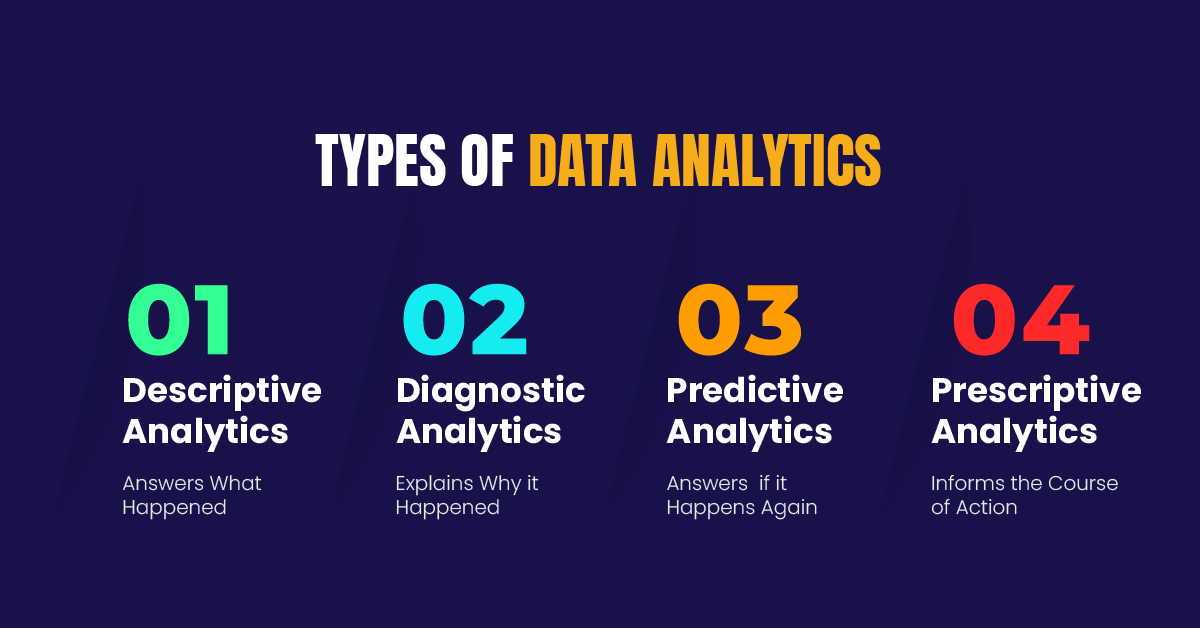
Analysis means a detailed examination of anything complex in order to understand its nature or to determine its essential features, that is exactly what is done when we use the term data analysis.
Utilizing raw data to extract useful information from it to help businesses make better decisions, enhance processes, or provide actionable insights, depending on the organization’s goal.
There are different types of data analytics that are performed, which when used in iterations of combinations can fetch great results for the organization. The types of Data Analytics are:
- Descriptive Analytics
- Diagnostic Analytics
- Predictive Analytics
- Prescriptive Analytics
Each type of analytics focuses on answering one question. Descriptive Analytics will answer what happened, Diagnostic Analytics will tell us why it happened, Predictive Analytics will answer if it will happen again, and Prescriptive Analytics will inform the course of action.
What are the Responsibilities of a Data Analyst?
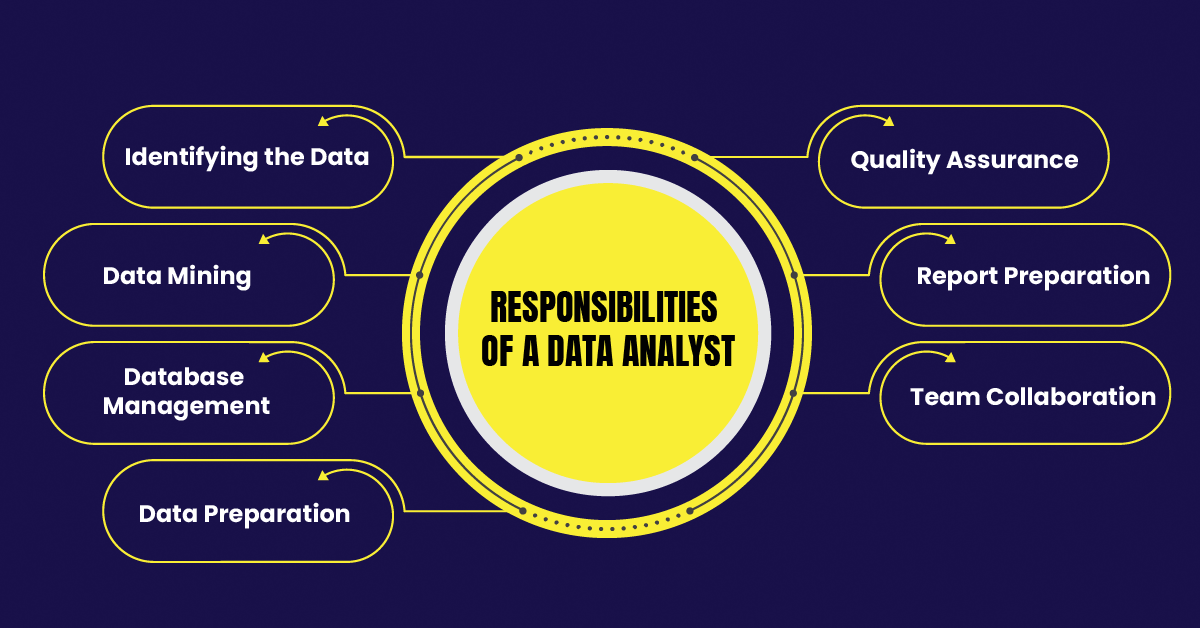
The key responsibilities performed by a Data Analyst will vary & depend on the kind of organization they are working for, however, at the core, they will have the following responsibilities:
1. Identifying the Data
Once the Data Analyst has understood the organizational goal, the first step is to identify the correct data set that needs to be analyzed.
2. Data Mining
Also known as knowledge discovery in data (KDD), is the process of extracting valuable information from large and unstructured datasets. It is one of the most intensive steps in the data analysis pipeline.
3. Database Management
Managing a database or data warehousing refers to the designing & maintaining of database systems, including SQL databases.
4. Data Preparation
The extracted data is usually unorganized and has missing values, the Data Analyst cleans the data for analysis and prepares it for manipulation & visualization by Data Scientists.
5. Quality Assurance
It is always quality over quantity, if the organization has a plethora of datasets but they aren’t usable then the whole process becomes redundant. Therefore, it is the responsibility of a Data Analyst to make sure that the collected data is relevant to the business/organization.
6. Report Preparation
Data Analysts prepare reports via data visualization tools to present the collated information that can further be used to analyze certain business factors such as profit, market analysis, performances, etc.
7. Team Collaboration
To ensure smooth business operations, collaboration is of utmost importance. The same holds true for Data Analysts as well, they collaborate with engineering teams, development teams, leaders, etc. to recognize process improvement & enhancement opportunities.
How to Become a Data Analyst?
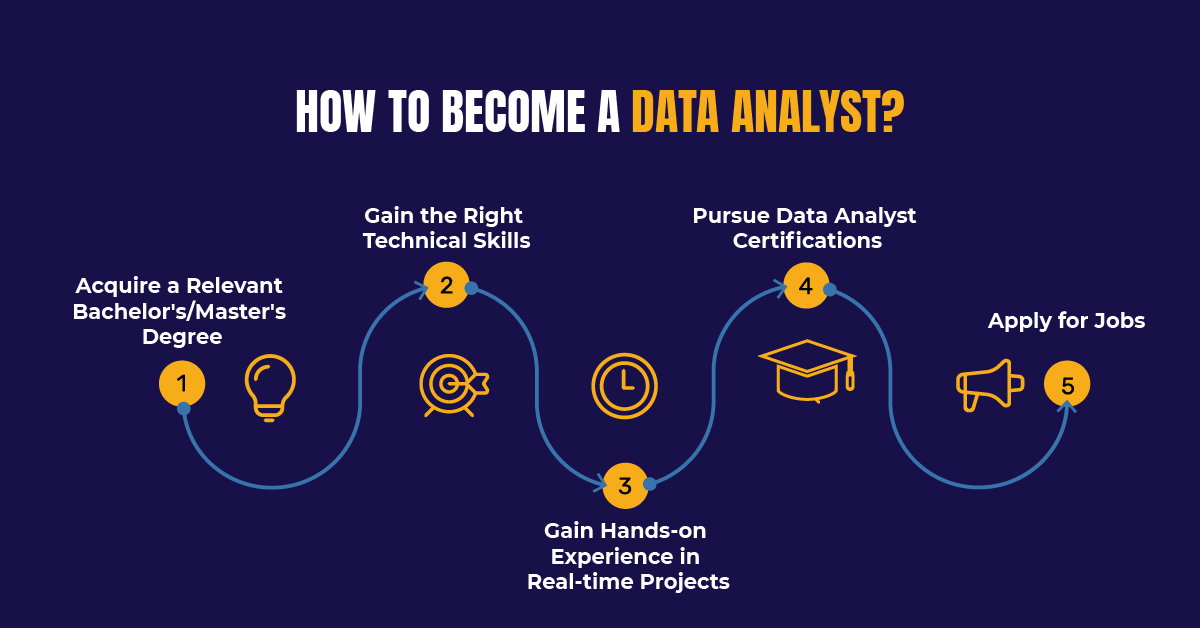
Now that you know the role & responsibilities of a Data Analyst, you should also know how to become one. We have listed below the steps that you can take if you want to build your career in the humongous field of data or if you’re looking to switch careers.
1. Educational Qualification
Holding a relevant degree to grab a Data Analytics job used to be the norm, but not anymore. A bachelor’s degree in any related field such as mathematics, statistics, computer science, or data science would do. Do note that professionals with a Master’s or Doctorate in Data Science are paid the big bucks, so if you are just starting out then a master’s will definitely boost your career growth.
2. Acquiring the right Skills
It doesn’t matter if you have a list of degrees or courses on your resume, if you don’t have the correct skill set then your career will not take off. Technical skills like Data Visualization, Data Cleaning, and Statistics are crucial to becoming a successful Data Analyst.
3. Hands-on Projects/Developing a Portfolio
The best way to display your skill set is by getting your hands dirty and doing the real work, i.e. projects with real-time data. Doing so will not only help you acquire & enhance your technical skills but will also help you in developing a solid portfolio.
4. Certifications
There are numerous certification courses available online, take up a few to brush up on your skills and stay up to date with the industry trends.
5. Apply for Jobs
Once you have all of the above in place, you can start applying for entry-level jobs to gain the necessary experience and build your career trajectory from thereon.
Must-Have Skills for Data Analysts
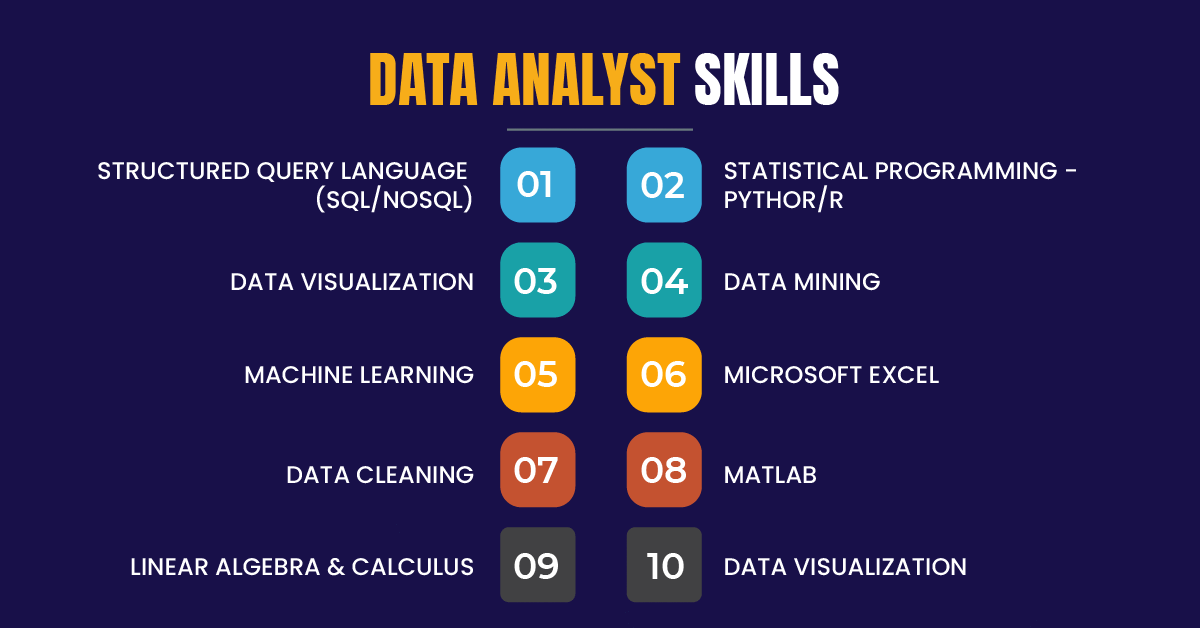
The right set of skills can be a game changer in your Data Analyst journey, we are listing a few must-have technical skills that a Data Analyst should hone.
- Structured Query Language (SQL/NoSQL)
- Statistical Programming – Pythor/R
- Data Visualization
- Data Mining
- Machine Learning
- Microsoft Excel
- Data Cleaning
- MATLAB
- Linear Algebra & Calculus
- Data Visualization
- Data Modeling
These were a few technical skills, but for a professional to work efficiently certain soft skills are required as well, to name a few:
- Critical Thinking
- Communication
- Coordination
- Research
Why Should You Consider a Career in Data Analytics?
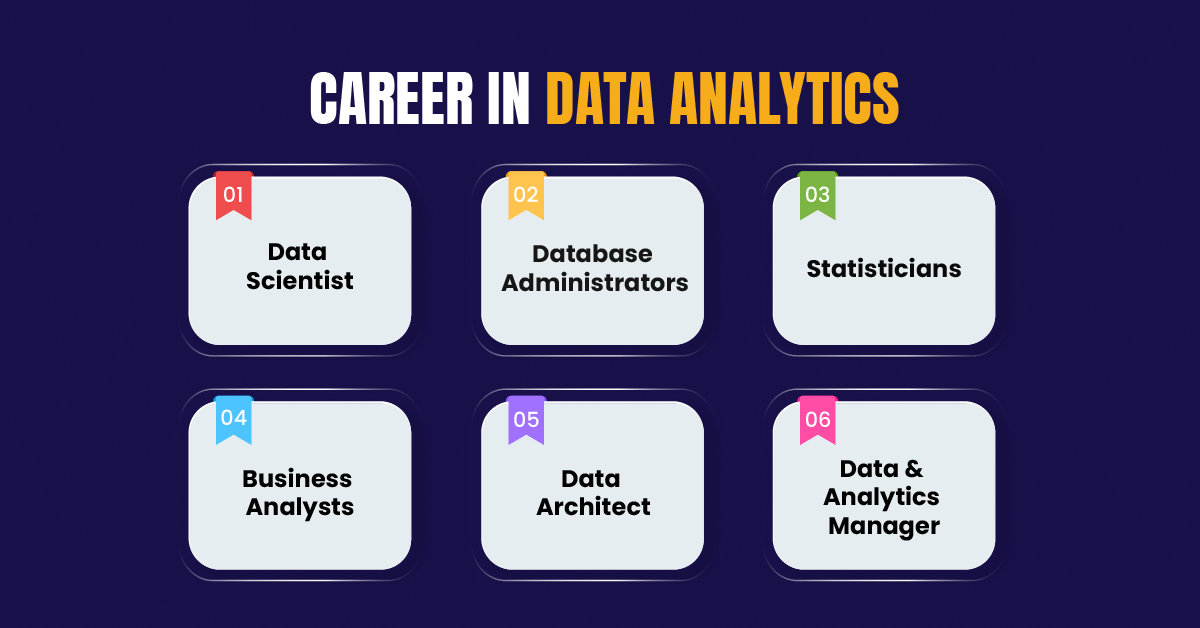
India’s data analytics industry alone is set to touch USD 118.7 billion by 2026, which will create millions of jobs for Data Analytics professionals. It is, therefore, safe to say that a career in Data Analytics can be highly rewarding. Not just in India, Data Analysts are taking the world by storm, it is also listed as number two in growing jobs in the United States.
A career in Data Analytics is not limited to becoming a Data Analyst, there are other options worth exploring, we have mentioned a few of them below:
- Data Scientist
- Database Administrators
- Statisticians
- Business Analysts
- Data Architect
- Data & Analytics Manager
Data Analyst v/s Data Scientist
Since both professions rely heavily on data, they are often used interchangeably, but that is factually incorrect. The core difference between a Data Analyst and a Data Scientist is how they use the data. The former works with data to solve business problems by creating actionable insights, while the latter focuses on predicting the future and designing predictive modeling processes.
Data Analyst Salary
To make things easier for you, we have curated a list of countries that pay handsomely to Data Analysts.
| Country | Salary |
| United States | USD 120,000 |
| Australia | USD 111,000 |
| Israel | USD 88,000 |
| Canada | USD 81,000 |
| Germany | EUR 71,000 |
| Netherlands | USD 75,000 |
| Japan | USD 70,000 |
| United Kingdom | USD 66,000 |
| Italy | USD 60,000 |
| France | EUR 76,900 |
Our Upcoming Training
Our Advanced Insight from Data Training is a IBF accredited training program that allows you to claim upto 90% course subsidy if you are a citizen or a permanent resident of Singapore. Check our upcoming trainings and upskill yourself to have a smooth career trajectory:
| Name | Trainer | Schedule |
|---|---|---|
| MariaDB Training | Ajit Kumar | View Schedule |
| Certified Agile Coaching | Jerry Rajamoney | View Schedule |
| Cloud Security Knowledge | Sarbojit Bose | View Schedule |
The Key Learnings to Answer the Frequently Asked Questions
1. What does a Data Analyst do?
Data analysts help businesses solve problems or provide them with actionable insights to enhance their operations by collecting & analyzing data.
2. How to become a successful Data Analyst?
With the right skills such as Python, Statistical Analysis, SQL, and Data Mining and by effectively presenting your findings to the decision makers.
3. Is it possible to become a Data Analyst without a Degree?
Yes, while a relevant degree definitely helps and is still a requirement in certain companies, you can still become a Data Analyst if you have the right skills and you have spent time building your portfolio and gaining hands-on experience.
4. How much does a Data Analyst make?
The average salary for a Data Analyst is $ 69,517 in the United States as per Glassdoor. The salary varies depending upon the geography and size of the organization, but nonetheless, it’s a lucrative career option.
We strive to provide business professionals with the skills and knowledge necessary to increase work performance and drive greater return on investment for the global customers we support. Agilitics delivers customized technology and management training solutions to large corporations and government agencies around the world.


